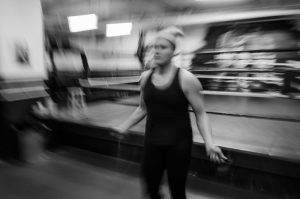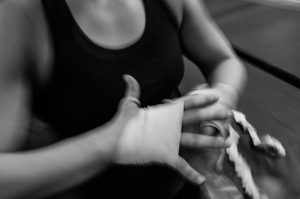While waiting to see the doctor
The first 48 hours after a blow are critical. The watchword? Rest, both physically and mentally.
If you do the right things during this period, you’ll recover considerably faster.
During the 48 hours following a blow to the head:
-
- Cease all physical activity.
-
- Limit all auditory and visual stimulation,
wear earplugs and sunglasses if necessary, and try to avoid noisy environments.
- Limit all auditory and visual stimulation,
-
- Limit your exposure to screens (TV, computer, phone).
If you have to contact someone, call instead of texting.
- Limit your exposure to screens (TV, computer, phone).
-
- Avoid concentrating for a long time.
This means no reading, no homework and no watching TV.
- Avoid concentrating for a long time.
-
- Relax.
Close your eyes and meditate. Focus on your breathing to relax you and keep your mind at ease.
- Relax.
- Stay hydrated by drinking plenty of water.
- Make sure that someone keeps you company
Tuesday morning, 10 AM, I get a text from an amateur boxer:
It’s possible to have a long career in boxing, to compete at a high level while maintaining a healthy brain. But, in order to do so, you have to be able to recognize the symptoms that might indicate a concussion so you can rest as soon as you feel them – not 3 days later or after the next competition. In short, you must rest your brain the same way that you rest your muscles after a demanding workout.
Do you know all the symptoms?
The symptoms obviously vary from one person to another and even from one concussion to next for the same person. Unless you are (really!) unlucky, you will not get them all.
Headaches, vomiting and vision problems are easy to identify, but other symptoms are more subtle: feeling slow or foggy, nervousness, mood swings, feeling a pressure in the head or having very low energy. If you don’t pay attention, you can easily miss these symptoms and think they are due to something else (#finaltermexams #worktrainsleepworktrainsleep #canadianchampionshipmode).
Yes, that’s it.
When in doubt, rest for 48 hours, then come back to training gradually. If the symptoms reappear during training, it means that you need more rest. And, if you need several rest periods, start with a low intensity exercise every time you go back to training.
Examples:
- I do shadow and I get dizzy: I stop, I rest for another 48 hours.
- I go for a light jog (rather than sprints) and I feel good: next time I can increase the intensity.
Don’t be fooled by your « little voice » or someone who says that « it’s normal to have headaches. » It may be common in boxing, yes, but it’s not normal.
In the long run, it will always be better to « waste » 48 hours of training than to compromise your health for life. If you don’t take the necessary measures to rest your brain when it needs it, your body may end up forcing you to stop for much more than 48 hours.
Is it good to sleep after a blow to the head?
No, not in the first 2 hours after impact. It’s also necessary to monitor the athlete closely during these 2 hours. « If a person is extremely sleepy in the hours following a trauma to the head and cannot be woken up, call 911 and go to the ER immediately,” says Dr. Hugo Hébert, who works with National Team athletes, including the Boxing Canada team. « The occurrence of intracranial bleeding after a boxing bout is rare, but it happens, even among amateur boxers. There were 2 deaths last year in the UK, » he adds.
The athlete should not be left alone and must go to a hospital at once if they:
- Have a headache that gets worse
- Are very drowsy or can’t be awakened
- Can’t recognize people or places
- Have repeated vomiting
- Behave unusually or seem confused; are very irritable
- Have seizures (arms and legs jerk uncontrollably)
- Have weak or numb arms or legs
- Are unsteady on their feet; have slurred speech
Contrary to what was once believed, athletes can sleep after 2 hours if none of these unusual symptoms are present. It’s even good to do so, because sleep contributes to recovery.
If you are unsure of the athlete’s condition, you can let them sleep (after the 2-hour period), but wake them up after 1 hour. Then ask them a few questions to check their state of consciousness and reactions.
Advil, ibuprofen and other non-prescription drugs that cause drowsiness should be avoided. Tylenol can be taken for headaches.
The headache should not last more than 3 days. If it does, see a doctor immediately.

Get your baseline: it matters!
Basically, a baseline test is a series of assessments and examinations that indicate how your body and brain respond, and how you feel in your “normal state”. All athletes should consult their physiotherapist or doctor at the beginning of the year to complete this test.
What’s the point?
« »Let’s an athlete who thinks he’s had a concussion comes to see me without a baseline and tells me that he has no more symptoms. If he asks « am I cured? « , I can never be sure that his concussion is resolved, since I don’t have anything to compare with, » says Dr. Hébert.
With a baseline, however, your doctor will be better equipped to diagnose the concussion, because he will have before and after information on your condition. And, most important of all – and this is the part that matters – he will be able to tell you exactly what to do to recover effectively and return to the competition when you are perfectly healthy.
Many sports therapists, physiotherapists and of course doctors are qualified to do these tests. SCAT3 is the world’s most popular one, because it’s free.

Dehydration + punches + alcohol = brain damage
Dehydration makes the brain more fragile. Dehydrating to make weight, taking punches, then drinking alcohol (i.e. getting dehydrated even more!) is far from a desirable scenario for your brain! Yet this is what many athletes do when they celebrate a victory or get over a loss. As much as possible, stay hydrated before, during and after exercise, whether in training or at a tournament. Celebrate with fries, cake and a tasty Gatorade! 😉
Concussion Resources
In Montreal, for athletes identified as Excellence, Élite, Relève et Espoir :Clinique médico-sportive de l’INS (at the stadium).
In Montreal, for everyone: The Université de Montréal medical clinic (CEPSUM). Make an appointment once you have a note from your family doctor or physiotherapist advising you to see a sports doctor for concussion symptoms. The consultation is free with your health insurance card.
In the Québec City region, for athletes identified Excellence, Élite, Relève et Espoir : contact Pascale Délisle, Excellence sportive Québec-Lévis : pdelisle@esql.ca or +14186562316.
In the Québec City region, for everyone: Cortex is a private clinic specializing in the prevention, management and treatment of concussions.
In Sherbrooke, for athletes identified as Excellence, Élite, Relève et Espoir :contact Émilie Roy, Excellence sportive Sherbrooke : emilie.roy@excellencesportive.com or +18198212002 poste 323.
Info-Santé 811 (24 hours a day, 7 days a week)
Dialing 811 promptly puts you in contact with a nurse in case of a non-urgenthealth issue. However, in the event of a serious problem or emergency, it is important to dial 9-1-1 or go to the emergency room.
Advantages and disadvantages of different resources
UER doctor (at the hospital) or at a walk-in clinic: « immediate » access but generally no follow-up.
Family doctor: Family doctor: The access times are variable, and the knowledge of concussion is also variable from one doctor to another. Some will be comfortable treating concussions, others less so. Fortunately there has been a lot of awareness raising in the medical communication on this subject in recent years. The average level of knowledge on concussions has definitely increased.
Sports doctor: Access is variable. Allow about 1 to 6 weeks before getting an appointment.
Neuropsychologist: Unless you are a National Team athlete, it will cost between $650 and $800 for an evaluation. Access is fast, however, since it’s private!
Kinesiologist with concussion subspecialty: Unless you are a National Team athlete, it will cost between $100 and $200 for an evaluation. Quick access, however, since it’s private!
See: the documentary After the Last Round

